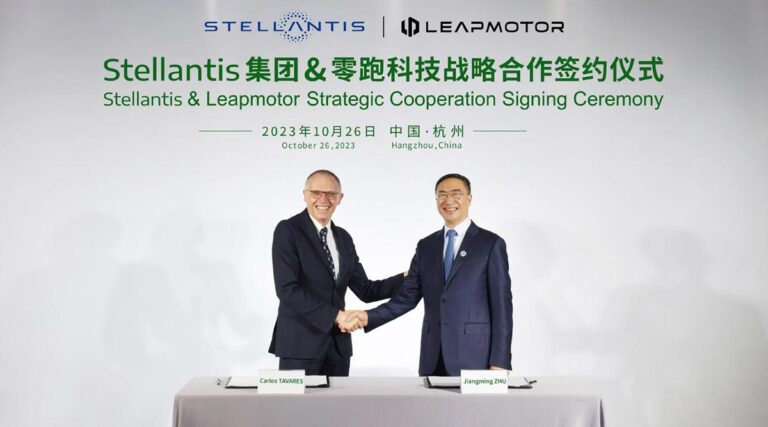This is the latest investment Leapmotor has received after announcing a 1.5 billion euro investment from Stellantis on October 26, with the subscription price a 70 percent premium to its closing price in Hong Kong today.

(Image credit: CnEVPost)
Chinese new energy vehicle (NEV) maker Leapmotor has received investments from two local government funds, after it received an investment from European automotive giant Stellantis NV just about three months ago.
Leapmotor entered into an H-share subscription agreement with the Zhejiang Jinhua city industry fund on January 19, and the company has agreed to issue H-shares totaling up to RMB 200 million yuan ($27.8 million), according to a Hong Kong Stock Exchange announcement today.
The subscription price is HK$43.80 per H-share, a 70 percent premium to Leapmotor's closing price of HK$25.80 on January 19.
Leapmotor also entered into a subscription agreement for its domestic shares today with the financial investment arm of Wuyi county, Jinhua city, to which it will issue 10.03 million domestic shares at a subscription price of RMB 39.86 (equivalent to HK$43.80) per share.
The gross proceeds to Leapmotor from these two agreements will total HK$659 million ($84.3 million), which will be used for research and development investments, marketing, enhancement of production capacity, increase in working capital and general corporate purposes.
These share subscriptions are strategic investments made by the investors and are of the same nature as other strategic investments that the company has recently gained, Leapmotor said.
This demonstrates the support for Leapmotor's electric vehicle business and the investoers' confidence in its long-term growth and prospects, the company said.
It also helps strengthen business and industrial cooperation in Wuyi county and Jinhua city, benefiting the local economy, according to the announcement.
Leapmotor is headquartered in Hangzhou, Zhejiang province, and it has a manufacturing facility in Jinhua.
The financing is the second Leapmotor has secured in the past three months, as it tries to gain more share in the competitive Chinese EV market.
Leapmotor announced on October 26, 2023 that Stellantis would invest €1.5 billion ($1.58 billion) in it and take an approximate 20 percent stake, making the European automaker the largest outside shareholder in the EV maker.
Stellantis' investment includes subscribing to 194 million new shares issued by Leapmotor and spending HK$3.492 billion to buy all 90 million Leapmotor shares held by video surveillance equipment maker Dahua Technology.
Notably, Leapmotor's share price plummeted for several days after Stellantis' investment was announced, accumulating a drop of about 26 percent in four trading days.
On October 31, Leapmotor said in an announcement that its founding team had pledged not to transfer or reduce their stake in the company in any way over the next 10 years.
Founded in 2015, Leapmotor's models on sale include the mini EV T03, the coupe model S01, the flagship SUV model C11, and the flagship sedan C01.
Leapmotor initially offered only battery electric vehicle (BEV) models and unveiled plans to release EREV models in 2022 to target the larger market for plug-in hybrids.
It began pre-sales earlier this month for its new model, the C10, which is offered in both extended-range electric vehicle (EREV) versions and BEV versions, with an official launch set for March 1.
The pre-sale price range for the C10 EREV is RMB 151,800 to RMB 181,800, and the pre-sale price range for the C10 BEV is RMB 155,800 to RMB 185,800.
The Leapmotor C10 is roughly half the price of Li Auto's (NASDAQ: LI) five-seat SUV, the Li L7, which is only available in EREVs and is currently priced at a starting price of RMB 319,800, RMB 339,800, and RMB 379,800 for the three options.
Leapmotor delivered a record 18,618 vehicles in December and 144,155 vehicles in 2023, up 29.67 percent from 111,168 in 2022.
